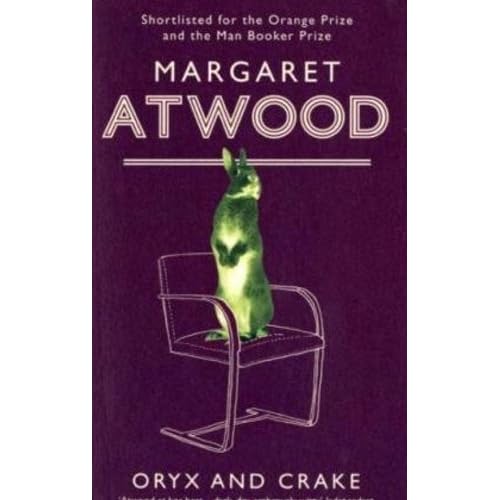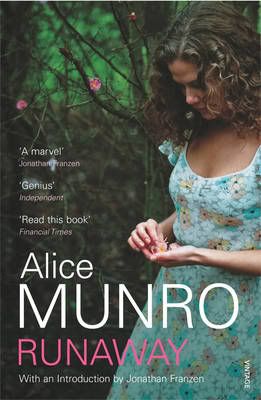 It was in September 2009 when I purchased Atwood's Oryx and Crake, and it's been sitting on my shelf since, feeling slightly neglected. I've heard mixed reviews about the book, so procrastination played its part in the delay, but I finally did pull it out, being in the mood for some post-apocalyptic fiction.
My Atwood point-of-reference is The Handmaid's Tale, a book I can't recommend enough, and considering that, I thought this fell slightly short of my expectations. It might be because The Handmaid's Tale sets an incredibly high standard. I mean, all said and done, Oryx and Crake was shortlisted for both, the Booker Prize and the Orange Prize.
It was in September 2009 when I purchased Atwood's Oryx and Crake, and it's been sitting on my shelf since, feeling slightly neglected. I've heard mixed reviews about the book, so procrastination played its part in the delay, but I finally did pull it out, being in the mood for some post-apocalyptic fiction.
My Atwood point-of-reference is The Handmaid's Tale, a book I can't recommend enough, and considering that, I thought this fell slightly short of my expectations. It might be because The Handmaid's Tale sets an incredibly high standard. I mean, all said and done, Oryx and Crake was shortlisted for both, the Booker Prize and the Orange Prize.
There's Jimmy, who has witnessed (and played a part in)the apocalypse, and is the lone human survivor, along with the children of Crake (called Crakers), and many genetically modified animals, including pigoons (a cross between pigs and raccoons used to harvest organs), rakunks (a cross between rats and skunks, which have no purpose but to serve as pets) and scary wolvogs. He reflects on the past and how he's ended up where he is, as he tries to figure out a way to survive this new reality.
Jimmy's childhood is an exaggeration of life as we know it: Online gaming and communities, pornography, watching live execution channels, playing chess and just hanging out with Crake, his closest friend. Yet, he grows up in a compound where pigoons were created and continue to be genetically modified so as to harvest more organs, and he has a rakunk as a pet. Negligent parents, no siblings, same story.
Yet, where Jimmy is ordinary, Crake is extraordinary. He is competitive, intelligent, and envisages a futuristic society where immortality can be contemplated.
Immortality [...] is a concept. If you take ‘mortality’ as being, not death, but the foreknowledge of it and the fear of it, then ‘immortality’ is the absence of such fear.
And, he conceives a world where the inhabitants are inherently nonchalant about sex and violence. They are stronger, prettier, more resilient, and can handle the stronger UV rays after the ozone layer depletes. Then, he plays god, and so, the children of Crake are born. Crake's focus on science and complete disregard of humanity as is (must end the world to create a better one philosophy) is almost scary. At what point does anyone have the right to play god? And who, if anyone, is there to check him? It might not be possible as things stand, but what if a couple of centuries later, someone did figure out how to bring "better" people into the world? Or, why not just leave life to evolution? Is that being too boring?
"As a species we're doomed by hope, then?"
"You could call it hope. That, or desperation."
"But we're doomed without hope as well," said Jimmy.
"Only as individuals," Crake said cheerfully.
"Well, it sucks."
"Jimmy, grow up."
Crake wasn't the first person who had ever said that to Jimmy.
While the Crakers were still being "developed" and taught, the deadly virus strikes, killing everyone but Jimmy, who has never interacted with them earlier, but has promised Oryx that he would take care of them, if disaster struck. It's almost as though she knew what was coming...
Oryx - the sole female protagonist - stayed calm, composed and unearthly throughout the book. Not prone to any extremisms, and in a state of perpetual indifference, Oryx almost came across as a robot. Strange as she had been sold by her parents to a gentleman, and eventually ended up as a child porn star, after which she encountered a string of unpleasant things. But her lack of emotions just made her seem too far and too distant from reality (whereas, I think, the gross exaggeration of Jimmy's childhood gets the reader closer to him).
And so - when Oryx and Crake, and everyone else die, Jimmy starts looking after the Crakers and answering the multitude of questions they throw his way - most of the answers he just makes up as he goes along. Crake has a god-like status amidst his "children" and Jimmy (or Snowman as he is now known) a demi-god-like status. He tries to use it to his advantage, but he really does try to do the right thing. That's what makes Jimmy's character slightly blasé: things happen around him in spite of him. He is not a catalyst, he is not the chemical - he's just the neutral, watching things unfold.
I think that's where my problem with the book lay the characters! I found I cared little, if at all, about them. Honestly, the only character that seemed to have a real role was Crake, but the narrative was such that it didn't give us much insight into him. Instead, the narrative centred around Jimmy and his battles as he lives with the Crakers by the beach, trying desperately to just - survive. Just thinking aloud - I think it would have been extremely interesting if the book was written from the point of view of Crake, and what was driving him. We get a high-level insight into his philosophies, but... I felt as though I needed more.
What are your favourite dystopian novels? Which would you recommend over all else?
 As some of you may already know, I'm
As some of you may already know, I'm  I'm still playing catch-up on 13th June's
I'm still playing catch-up on 13th June's  This book is not in the same league as A Fine Balance, or even, for that matter, Family Matters. However, the more I think about this book, the more I appreciate it. Mistry has this amazing knack of bringing to life a realistic Indian society, and how they handle various crises and catastrophes that life brings in its wake.
This book is not in the same league as A Fine Balance, or even, for that matter, Family Matters. However, the more I think about this book, the more I appreciate it. Mistry has this amazing knack of bringing to life a realistic Indian society, and how they handle various crises and catastrophes that life brings in its wake.